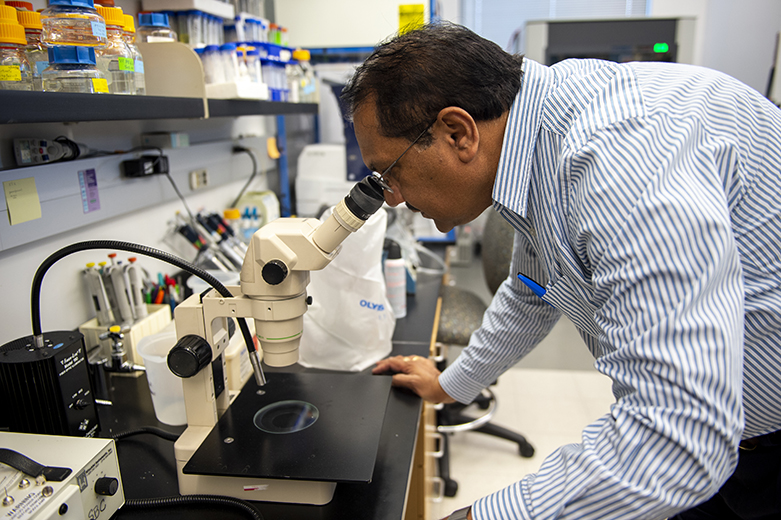We’re seeking exceptional faculty to move Mizzou forward in national scientific priority areas related to biomedical research and health. To further interdisciplinary collaboration, the university will consider faculty candidates in several areas of research.
A successful MizzouForward candidate is an accomplished researcher with a passion for collaboration and the desire to address our world’s most pressing needs. The colleagues we’re looking to recruit possess:
- A proven track record of external research funding, particularly from federal agencies
- A research agenda that complements the goals of MizzouForward
- A strong publication record
- Evidence of external recognition of one’s work, such as national awards and honors, membership with national academies, etc.
- Interdisciplinary research that has the potential to impact multiple disciplines
If you’re interested in learning more or you know an exceptional investigator who can help us reach our research goals, we want to hear from you. Faculty ready to move Mizzou forward should apply now.
- The opportunity for clinical collaboration–scientists collaborate with clinicians to bring new treatments from the research bench to the bedside.
- Promotion of translational research with the goal of developing novel medical interventions that improve clinical outcomes.
- Core facility access that provides cutting-edge technologies and expertise necessary for advances and interdisciplinary research.
- Centrally located facilities offering both large and small animal access for researchers, creating cross-campus collaborations.
- Facilitation of inter-department presentations to foster a collaborative environment (e.g., Grand Rounds, Seminar Series, Dalton Cardiovascular Forum, NextGen Precision Health Science Seminars).
- Alliance for Precision Health is a 10-year, $113 million alliance that brings together the University of Missouri and Siemens Healthineers to transform the way health care is delivered. The agreement ensures NextGen researchers have unparalleled access to leading-edge diagnostic and therapeutic equipment now and in the future.
- Animal Modeling Core offers expert advice and essential services associated with the generation and characterization of animal models through traditional approaches like embryonic stem cell modification as well as cutting-edge CRISPR/Cas9 tools.
- Bond Life Sciences Center helps develop biomedical treatments for human diseases and is currently working toward groundbreaking gene-editing tools through the latest expansion of the NIH’s cell and Somatic Cell Gene Editing Consortium.
- Cell and Immunobiology Core provides high-quality services for research such as a supply center, tissue culture lab, flow cytometry facility and Seahorse analyzer.
- The Clinical Research Center bring scientific discovery to the realm of patient care by supporting patients, volunteers and researchers who participate in clinical trials.
- Dalton Cardiovascular Research Center explores cardiovascular complications associated with aging, diabetes, obesity, cancer and hypertension.
- Genomics Technology Core features cost-effective, timely genomic services. Facility staff educate and train researchers and students in the use of sequencing technologies with a focus toward implementation of emerging technologies.
- Electron Microscopy Core offers access to scanning and transmission electron microscopes as well as assistance, training and ancillary equipment to help researchers process, analyze and visualize a wide variety of materials and biological samples.
- Nextgen Cognitive Neuroscience Systems (CNS) Core provides state-of-art instrumentation and laboratory space for conducting translational cognitive neuroscience research.
- Nuclear Medicine and Positron Emission Tomography Imaging Center provides the ability to perform nuclear medicine and PET studies for animals.
- University of Missouri Research Reactor is the nation’s most powerful university reactor and sole U.S. provider of several radioisotopes used in radiopharmaceuticals.
- MU also houses two NIH funded swine centers (National Swine Resource and Research Center and Swine Somatic Genome Editing Center) as well as the NIH funded Mutant Mouse and Rat Resource & Research Centers and state-of-the-art campus supported core facilities, such as the Animal Modeling Core, the Bioinformatics and Analytics Core, the Cell & Immunobiology Core, the Cognitive Neuroscience Systems Core, the Charles W. Gehrke Proteomics Center, the Genomics Technology Core, the Metabolomics Center, the Molecular Interactions Core, the Nuclear Magnetic Resonance Core, and various PET Imaging Centers.
- Another major resource aligned with this strategic hiring initiative is the University of Missouri Institute for Data Science and Informatics (MUIDSI), as well as a high-power computing and storage data ecosystem, the Hellbender.
MizzouForward is comprised of multiple advisory committees. Each committee is interdisciplinary in its composition and they review the applicant materials, conduct Zoom interviews with candidates and make recommendations to the hiring authorities.
